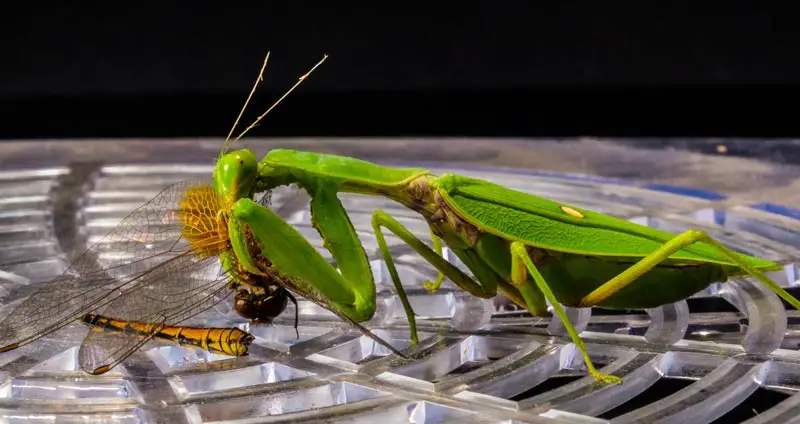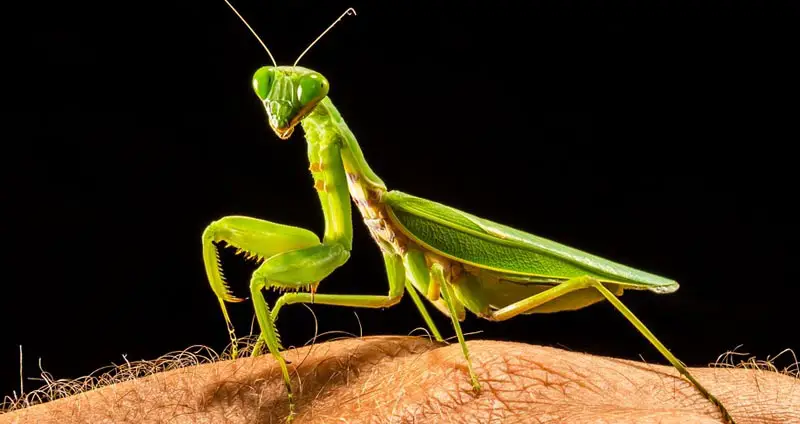Out of all the insects in existence, praying mantis are some of the most interesting out there. Their appearance is extremely unique, and the way that they hunt is so interesting.
These well-received bugs are appreciated both in the wild and as pets. In fact, they’ve become some of the most commonly-kept pet insects!
However, are praying mantis dangerous to humans? Do they bite or pose another threat? As they’re such great hunters, this is a logical thought/fear to have.
Table of Contents
Do Praying Mantis Bite?
Yes, praying mantis do bite, but it’s extremely uncommon. More specifically, they have the ability to bite — they just don’t choose to most of the time.
Obviously praying mantis have the ability to bite as it’s how they kill and eat their prey, but they don’t bite humans unless it’s an accident or a last-resort to escape.
As these are wild animals, random bites can occur — they’re difficult to predict. If you are bitten, though, don’t worry. Their mouths are very small and likely won’t even break the skin.
What To Do If You’re Bitten
If you’re bitten by a praying mantis, there isn’t really anything that you need to do. Praying mantis aren’t venomous, so their bites aren’t harmful beyond the initial bite.
All that’s recommended is to wash your hands after the bite and maybe apply some anti-bacterial ointment if the skin is broken.
The best thing for you to do is simply avoid being bitten altogether — a very easy task.
When handling a praying mantis, you can use gloves to reduce the chance of a bite to zero. Additionally, handle them very gently and don’t restrict their movement in any way.
A praying mantis will either bite you if it mistakes you for food (which is unlikely) or if it’s trapped and bites you in an attempt to get away.

Other Praying Mantis Defense Mechanisms
Most praying mantis grow to be between 2″ and 5″ in length and don’t bite for self-defense. How do they defend themselves, then? Do they have other defensive strategies that could be dangerous to humans?
First and foremost, praying mantis will use their surprising agility to quickly get away from danger. They can leap in the blink of an eye, and most males are able to fly surprising distances.
This is why they won’t resort to biting you — they’ll simply run away when threatened.
So, what else is a praying mantis capable of? Are they dangerous in any way?
Are Praying Mantis Poisonous?
No, there are no praying mantis species that are poisonous or venomous in any way.
If a praying mantis bites you, they aren’t injecting any venom or harmful bacteria that will cause you any harm.
Also, if you were to somehow accidentally ingest a praying mantis, they contain no poison that would make you sick.
So, there’s absolutely no chemical danger when it comes to praying mantis.
Do Praying Mantis Spit?
The general consensus is that praying mantis don’t spit. Not only do they not spit acid, but they don’t spit in general. No scientific studies regarding this behavior have been conducted.
However, if a praying mantis were to spit, it would be similar to the spit of a grasshopper — harmless.
This spit is made from a mixture of digested food and digestive enzymes that are spit up when threatened. Aside from smelling/tasting bad and being sticky, this spit poses no threat, either.
So, if a praying mantis were to spit on you, it wouldn’t be dangerous.
Are Praying Mantis Dangerous?
All things considered, praying mantis are not dangerous to humans at all.
The only real threat that praying mantis pose is a minor bite that likely won’t even break skin — that’s it!
Their effective hunting/killing strategies really only work on their natural prey, not on humans.
So, if you come across a praying mantis, don’t worry! They may look very intimidating and dangerous, but they rarely, if ever, bite. If they do bite, it’s extremely underwhelming.

